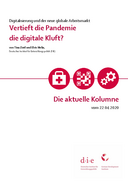
Vertieft die Pandemie die digitale Kluft?
Zintl, Tina / Elvis Melia (2020)
Die aktuelle Kolumne, 22. April 2020
Im Zuge der drastischen Maßnahmen, die die Welt ergreift, um die Infektionsraten des Coronavirus zu verlangsamen, arbeiten inzwischen Milliarden von Zuhause aus. Aber vielen anderen, insbesondere in Ländern mit niedrigem und mittlerem Einkommen, fehlen die Voraussetzungen, um bei Social Distancing und digitalen Arbeitsformaten nachzuziehen.